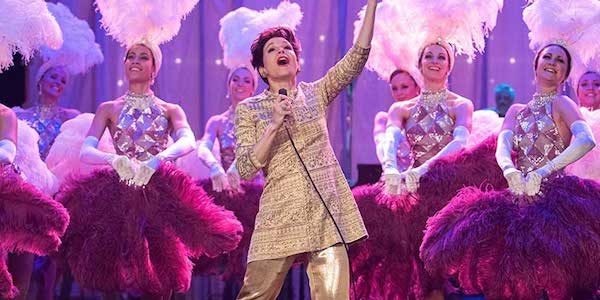
ReelBob: ‘Judy’ ★★½
By Bob Bloom
Sometimes a performance can compensate for the deficiencies in a film script.
Renee Zellweger’s showcase as Judy Garland in “Judy” comes close, but the movie undermines her at different junctures.
“Judy,” based on the play, “End of the Rainbow” by Peter Quilter, takes place mainly in 1968 and ’69 London where Garland, broke and with weakened voice, is set to perform for five weeks at a club called The Talk of the Town.
By this stage of her life, Garland, at 46, is a shell of her former self. Besides having no money, she has no place to live. She must leave her two youngest children, Lorna and Joey, with their father, Sid Luft, Garland’s fourth ex-husband who gambled away a large part of her earnings.
To make money to buy a house so she can retain custody of the children, she reluctantly accepts the London gig, feeling that she is abandoning her kids.
“Judy” is a sad movie. It’s a depressing study of a great star aged far beyond her years through her abuse of pills and alcohol, initially spurred on by a movie studio that treated her as a commodity instead of a person — and a teenage one, at that.
As portrayed by Zellweger, Garland is an insecure, self-centered, mercurial and demanding prima donna, constantly worried that she has been — or will be — forgotten.
She suffers from nerves before going on stage, and when she is in her hotel suite, she is unable to sleep.
She is always self-medicating, either to give herself energy to perform or bring her down so she can rest.
In flashbacks, we see how MGM studio boss Louis B. Mayer and his staff mentally abused young Judy, telling her that she was fat and not as pretty as other girls.
They constantly monitored her eating, denying her food when they believed she was gaining weight. They gave her pills to keep her up her strength so she could work 16 hours a day at times; then they pushed other pills that allowed her to sleep.
Zellweger captures the essence of Garland’s manic behavior, without doing an impersonation of the performer.
On stage, she depicts the jerky mannerisms Garland used during her performances — the fluttering of her hands and the herky-jerky movements of her body.
It is commendable that Zellweger does her own singing, working hard to capture Garland’s intonations. What she cannot replicate is the power or energy of Garland’s voice. She can interpret her songs and come close to the originals, but she fails to scale the heights — or demonstrate the fabled charisma — that drew audiences to Garland.
“Judy” is at its best during some intimate moments in which she is vulnerable and emotionally naked.
The movie’s best sequence comes after a show in which Garland goes out to dinner with a gay couple who worship Garland. Much to the men’s consternation, nothing is open, so they all go back to the men’s apartment, where they eat scrambled eggs and talk.
One of the men begins playing the “Get Happy” on the piano and Judy begins singing a very melancholy version of the song.
She later tells her new friends that people like themselves are hounded because they are different — and regular people fear different.
It is a touching scene that feels very honest.
Some aspects of “Judy” script by Tom Edge just feel incomplete — like the quick romance with Mickey Deans, who becomes her fifth husband. They first meet at a party in Los Angeles, and the next time we see Deans, he is hiding under a serving cart surprising Garland in her London suite.
And, after a few scenes together, they marry.
Much of “Judy” is sketchily composed. The movie offers an unfinished picture of the artist. Director Rupert Goold, working from Edge’s adaptation, uses broad strokes to explain Garland; the movie lacks finesse and glosses over much of the turbulence in its subject’s life. To appreciate “Judy,” it almost feels as if you need to read one of the numerous biographies written about her.
And that brings us back to Zellweger. Her Garland is heartbreaking and very emotional. It’s obvious that Zellweger did her homework. She captures the emotional core of Garland, a woman desperate to be loved — a performer whose biggest addiction was applause.
She also shows the toll that adoration and success took on Garland. At one point she says that she is only Judy Garland one hour a night, when she is onstage. The rest of the time, she yearns to be a mother, a wife, a common person.
But as “Judy” shows, Garland could never be ordinary. When, near the movie’s finale, she offers a poignant rendition of “Somewhere Over the Rainbow,” you are touched.
The movie fades out, then coldly informs us that Garland died six months later at 47.
Garland lives, however, in her singing and her movies. And, through Zellweger’s performance, perhaps she will live again to a new generation of fans.
I am a founding member of the Indiana Film Journalists Association. My reviews appear at ReelBob (reelbob.com) and Rottentomatoes (www.rottentomatoes.com). I also review Blu-rays and DVDs. I can be reached by email at bobbloomjc@gmail.com or on Twitter @ReelBobBloom. Links to my reviews can be found on Facebook, Twitter and LinkedIn.
JUDY
2½ stars out of 4
(PG-13), substance abuse, language, adult themes, smoking